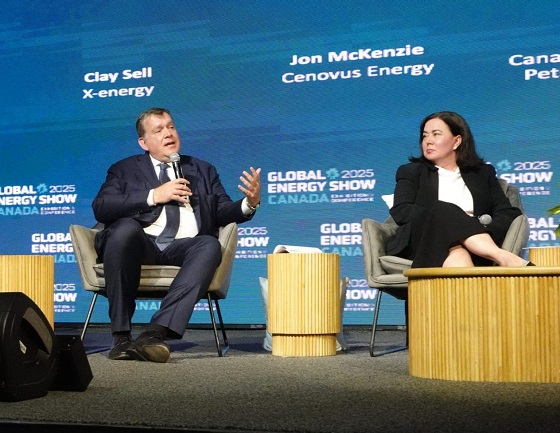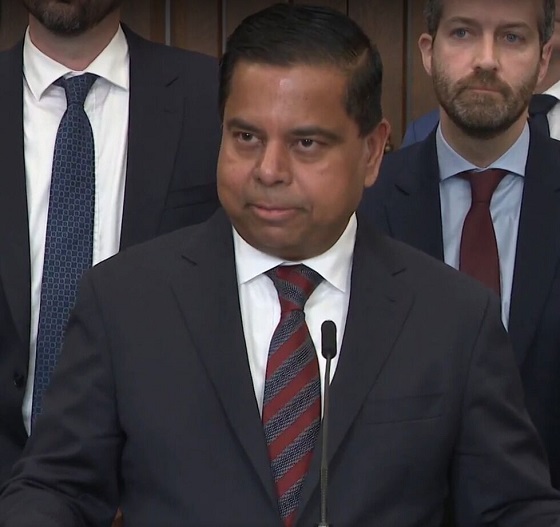Business
Vanishing lines and fading logic

From Resource Works
Canada’s road paint rules are fading fast—along with public patience
The short paint story that’s actually a big deal
Across Canada, road crews are repainting more often, spending more taxpayer money, and—ironically—emitting more carbon. Why? Because of a federal regulation aimed at reducing volatile organic compounds (VOCs) in traffic paint. The change sounds technical, even trivial. It’s not.
In warm months—from May 1 to October 15—Canadian regulations now cap VOC content in road marking paint at 150 g/L, down from 450 g/L the rest of the year. The reason? To reduce smog formation during periods of high air pollution risk.
But the real-world consequences are showing up fast. Paint doesn’t last. Lines fade. And in rural areas without streetlights, that’s not a minor annoyance—it’s a serious hazard.
This isn’t just a quirky tale of bureaucratic overreach. It’s part of a larger pattern where well-intentioned environmental policy drifts into untested technocracy—implemented with little transparency, consultation, or regard for operational impact.
Municipal leaders, from Halton Hills to Brazeau County, are speaking up. First responders and firefighters are reporting crashes tied to disappearing lane markings. Yet the federal stance remains firm: the air must be cleaned—whether or not the paint adheres.
And here’s the kicker. These seasonal VOC limits? They’ve been in place since 2012 under the Canadian Environmental Protection Act. But what’s new is a 2023 proposal to tighten VOC limits even further, aligning Canadian standards with California’s most aggressive targets. According to the Canadian Paint and Coatings Association (CPCA):
“Canada is now expected to meet these same low VOC limits in the proposed regulations expected to pass in 2024… If passed, the outcome will mean a loss of products for Canadians, a high cost of reformulation for businesses, and minimal or no improvement in air quality.”
Let’s be clear: these proposals have not yet been enacted. But the direction is unmistakable—and it’s raising alarms in industries that value both environmental responsibility and real-world functionality.
On environmental policy, we’ve crossed a line—ironically, one you can’t see anymore because the paint wore off.
The same pressure groups lobbying against Canadian resource development are now campaigning against VOCs in coatings. And once again, Ottawa is listening—without due consideration for trade-offs, unintended consequences, or operational feasibility.
Environmental rules must pass a basic test: Do they deliver measurable public benefit without causing disproportionate harm or risk? In this case, the evidence suggests the answer is no.
If new paint regulations increase taxpayer costs, degrade road safety, and achieve little to no net environmental gain, what exactly are we doing?
We all want to live in a cleaner world. But climate stewardship does not mean blind acceptance of every restrictive measure wrapped in green.
It means balancing outcomes, respecting evidence, and listening to those who are affected on the ground. A policy that forces municipalities to paint more often, at higher cost, with lower durability, is not sustainable by any definition.
Business
The carbon tax’s last stand – and what comes after

From Resource Works
How a clever idea lost its shine
For years, Canada’s political class sold us on the idea that carbon taxes were clever policy. Not just a tool to cut emissions, but a fair one – tax the polluters, then cycle the money back to regular folks, especially those with thinner wallets.
It wasn’t a perfect system. The focus-group-tested line embraced for years by the Trudeau Liberals made no sense at all: we’re taxing you so we can put more money back in your pocketbooks. What the hell? If you care so much about my taxes being low, just cut them already. Somehow, it took years and years of this line being repeated for its internal contradiction to become evident to all.
Yet, even many strategic conservative minds could see the thinking had internal logic. You could sell it at a town hall. As an editorial team member at an influential news organization when B.C. got its carbon tax in 2008, I bought into the concept too.
And now? That whole model has been thrown overboard, by the very parties had long defended it with a straight face and an arch tone. In both Ottawa and Victoria in 2025, progressive governments facing political survival abandoned the idea of climate policy as a matter of fairness, opting instead for tactical concessions meant to blunt the momentum of their foes.
The result: lower-income Canadians who had grown accustomed to carbon tax rebates as a dependable backstop are waking up to find the support gone. And higher earners? They just got a tidy little gift from the state.
The betrayal is worse in B.C.
This new chart from economist Ken Peacock tells the story. He shared it last week at the B.C. Chamber of Commerce annual gathering in Nanaimo.
 Ken-Peacock- B.C. Chamber of Commerce annual gathering in Nanaimo.
Ken-Peacock- B.C. Chamber of Commerce annual gathering in Nanaimo.
What is shows is that scrapping the carbon tax means the poor are poorer. The treasury is emptier.
What about the rich?
Yup, you guessed it: richer.
Scrubbing the B.C. consumer carbon tax leaves the lowest earning 20 percent of households $830 per year poorer, while the top one-fifth gain $959.
“Climate leader” British Columbia’s approach was supposed to be the gold standard: a revenue-neutral carbon tax, accepted by industry, supported by voters, and engineered to send the right price signal without growing the size of government.
That pact broke somewhere along the way.
Instead of returning the money, the provincial government slowly transformed the tax into a $2 billion annual cash cow. And when Mark Carney won the federal election, B.C. Premier David Eby, boxed in by his own pledge, scrapped the tax like a man dropping ballast from a sinking balloon. Gone. No replacement. No protections for those who need them most.
Filling the gas tank, on the other hand, is noticeably cheaper. Of course, if you can’t afford a car that might not be apparent.
Spare a thought for the climate activists who spent 15 years flogging this policy, only to watch it get tossed aside like a stack of briefing notes on a Friday afternoon.
Who could not conclude that the environmental left has been played. For a political movement that prides itself on idealism, it’s a brutal lesson in realpolitik: when power’s on the line, principles are negotiable.
But here’s the thing: maybe the carbon tax model deserved a rethink. Maybe it’s time for a grown-up look at what actually works
With B.C. now reviewing its CleanBC policies, here’s a basic question: what’s working, and what’s not?
A lot of emission reductions in this province didn’t come from government fiat. They were the result of business-led innovation: more efficient technology, cleaner fuels, and capital discipline.
That, plus a hefty dose of offshoring. We’ve pushed our industrial emissions onto other jurisdictions, then shipped the finished goods back without attaching any climate cost. This contradiction particularly helped to fuel the push to dump carbon pricing as a failed solution.
The progressives’ choice was made once the anti-tax arguments could no longer be refuted: to limit losses it would be necessary to deep six an unpopular strand of the overall carbon strategy. This, to save the rest. That’s why policies like the federal emissions cap haven’t also been abandoned.
To give another example, it’s also why British Columbia’s aviation sector is in a flap over the issue of sustainable aviation fuel. Despite years of aspirational policy, low emissions jet fuel blends remain more scarce than a long-haul cabin upgrade. The policy’s designers correctly anticipated that refiners would never be able to meet the imposed demand, and so as an alternative they provided a complex carbon credit trading scheme that will make the cost of flying more expensive. For those with a choice, nearby airport hubs in the United States where these policies do not apply will become an attractive alternative, while remote communities that have no choice in the matter will simply have to eat the cost. (Needless to say, if emissions reduction is your goal this policy isn’t needed anyways, since the decisions that matter in reducing global aviation emissions aren’t made in B.C. and never will be.)
I’m not showing up to bash those who have been genuinely trying to figure things out, and found themselves in a world of policy that is more complicated and unpredictable than they realized. Simply put, the chapter is closing on an era of energy policy naïveté.
The brutally honest action by Eby and Carney to eject carbon taxes for their own political survival could be read as a signal that it’s now okay to have an honest public conversation. Let’s insist on that. For years now, debate has been constrained in part by a particular form of linguistic tyranny, awash in terminology designed to cow the questioner into silence. “So you have an issue with clean policies, do you? What kind of dirty reprobate are you?” “Only a monster doesn’t want their aviation fuel to be sustainable.” Etc. Now is the moment to move on from that, and widen the field of discourse.
Ditching bad policy is also a signal that just maybe a better approach is to start by embracing a robust sense of the possibilities for energy to improve lives and empower all of the solutions needed for tomorrow’s problems. Because that’s the only way the conversation will ever get real.
Slogans, wildly aspirational goal setting and the habit of refusing to acknowledge how the world really works have been getting us nowhere. Petroleum products will continue to obey Yergin’s Law: oil always gets to market. China and India will grow their economies using reliable energy they can afford, having recently approved the construction of the most new coal power plants in a decade amid energy security concerns. Japan, which has practically worn itself out pleading for natural gas from Canada, isn’t waiting for the help of last-finishing nice guys to guarantee energy security: today, they are buying 8% of their LNG imports from the evil Putin regime.
Meanwhile, we’re in the worst of both worlds: our courageous carbon tax policy that was positioned as trailblazing not just for B.C. residents but for the world as a whole – climate leadership! – is gone, the poorest are puzzling over why things feel even more expensive, and nobody knows what comes next.
Bruce Dowbiggin
Canadians Thinks America Owes Them. Trump Has Other Ideas

Breaking: It’s now being reported that in the 2024 U.S. election, zero Canadians voted for Donald Trump. In fact, zero Canadians voted for anyone on the ballot. They’re not allowed to. And yet rage monkeys in the Canadian media seem to have the idea that Canada is— and should be— an immediate priority of POTUS 47.
Here’s Globe & Mail/ CBC wind therapist Andrew Coyne about ten exits past normal on the idea of Donald Trump on Canadian soil. Okay, on Alberta soil. “We’re going to roll out the red carpet for the wannabe dictator of America at the very moment he is moving to suppress dissent with armed force?” (You mean like the Truckers Convoy?)
Cartoonist Michael DeAdder, who likely cries if you use improper pronouns, says “Hold my kombucha”. His latest etching has Trump asking a veteran what he did in the war. The witty retort is “Fought against people like you”. Get it? Trump murders six millions Jews. But The Hill keeps this guy working, and the laughs just keep on coming. Free speech!

The presumption is jaw-dropping. Even as Trump’s approval rating hits 53 percent, Canadians online were echoing Democrats’ fever dreams of forming a shadow government to take over from Trump via coup. This sense of impunity at a distance is why the Canadian government— along with other drive-by virtue signallers UK, Norway, New Zealand, and Australia— have imposed sanctions on two sitting members of the Israeli cabinet. They know it will rile Trump’s America.
For ordinary Canadians, Trump became a post-it note to justify giving Team Liberal another swing at ruining the nation. “We used to be such friends! He’s a tyrant.!” This just in: Love him or hate him Trump is employed by Americans to do their bidding. He’s not a sentimental buddy of Canada who’ll cut us some slack for old time’s sake. He has no remittance from Canada to please the Laurentian elites. If your defence is non-existent and your military gender-obsessed: you had it coming.
Are his policies jostling Canada? Absolutely. Read Art of the Deal. The 51st state jibe when Justin soiled himself was rude. But it worked on pliant Canadian liberals. Now the The Little Banker is disavowing the dissolute decade of Trudeau while employing Conservatives’ policies on defence spending, inter-provincial trade and border security. Hell, he’s naming longtime Tories to his personal staff.

In the end Carney knows this ain’t mock Parliament. That his dossier begins and ends with satisfying the beast to the south. None of this should be a surprise. Yet Canadians dozed when Trump made clear in his election campaign that the American economy is the greatest in the world. If you want to fish in that pond it’s not going to be for free. That means tariffs for a range of U.S. industries that couldn’t compete in a Biden world.
We can argue how well tariffs work, but Trump wants them to reduce taxes on the people who elected him. Not the Canadians who fly first class but pay economy. And who have pushed his approval ratings into the 50s, higher than ever before. (Likely to spike higher after the No Kings Riot season peters out.)
No wonder Canadians preferred the guy before Trump, the senile sock puppet whose government was run by anonymous figures using the auto-pen. Sleepy Joe let Canada slide into mediocrity and financial peril without any judgement. It was comfortable. Then The Donald had the nerve to expose the ditch Canada was in.
Canada, Trump pointed out, was delinquent on its defence, harbouring Chinese drug lords, printing money like Canadian Tire and its banks were involved in money laundering. That was the nice stuff. Try Organized fentanyl networks operating with impunity in the largest cities of the nation So dumping on Trump in salty cartoons allows Canada’s Mod Squad to ignore the real issues that should have been litigated in the April election.
We have written extensively about the ruse that was played on gormless Canadians in “U.S. Voters Smelled A Rat But Canadian Voters Bought The Cheese” We have catalogued Canada’s drug and money laundering disgrace in “Chinese Gangs Dominate Canada: Why Will Voters Give Liberals Another Term?” We’ve described the real-estate bubble economy created by Trudeau and sidekick Carney that threatens to crash the economy and ruin seniors’ pensions in
In the end, it is still la-la-la-la We Can’t Hear You. Trump-obsessed Boomers more concerned with the equity in their jumped-up bungalows gave the finger to the next generations and blamed it all on Orange Man Bad. In the monotone of Canadian political comment it all seemed so easy. Turn against Trump. Cash another dividend. Cheer on MSNBC and CNN bitch sessions.
The Family Compact don’t get it. Their Antifa heroes down south plan demos and “nonviolent” activity to crater the public resolve. In Canada that still works. But in the U.S. the Covid reverb is hitting the natural governing class of the nation. While they craft fine phrases about democracy the consumers remember them using a virus to stop society.
The appetite for Gavin Newsom blovaitors and Jen Psaki fart catchers is crashing in America. Riots may be coming in the U.S., but it won’t be like George Floyd and Covid and the pussy hats. At some point Canada’s docile classes better wake up, too. America owes them nothing. They need to earn the respect.
Bruce Dowbiggin @dowbboy is the editor of Not The Public Broadcaster A two-time winner of the Gemini Award as Canada’s top television sports broadcaster, his new book Deal With It: The Trades That Stunned The NHL And Changed hockey is now available on Amazon. Inexact Science: The Six Most Compelling Draft Years In NHL History, his previous book with his son Evan, was voted the seventh-best professional hockey book of all time by bookauthority.org . His 2004 book Money Players was voted sixth best on the same list, and is available via brucedowbigginbooks.ca.
-

 illegal immigration1 day ago
illegal immigration1 day agoAnti-Trump protests planned across the country on Saturday as LA violence continues
-

 Economy2 days ago
Economy2 days agoCarney’s Promise of Expediting Resource Projects Feels Like a Modern Version of the Wicked Stepmother from Disney’s Cinderella
-

 Business1 day ago
Business1 day agoTelegram founder Pavel Durov exposes crackdown on digital privacy in Tucker Carlson interview
-

 Crime1 day ago
Crime1 day agoOntario Police’s Record Fentanyl Bust Suggests Cartel–Iranian–PRC-Supplied Nexus from Ottawa to Hamilton Along Six Nations Corridor
-

 Energy1 day ago
Energy1 day agoHow to realize Canada’s ambitions as an energy superpower
-

 Business8 hours ago
Business8 hours ago84% of Swiss hospitals and 60% of hospitalizations are in private facilities, and they face much lower wait times
-

 Business19 hours ago
Business19 hours agoJustice Centre launches new petition: Keep cash legal and accessible. Stop Bill C-2
-

 Business2 days ago
Business2 days agoEU investigates major pornographic site over failure to protect children



